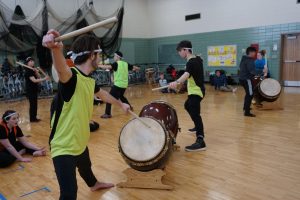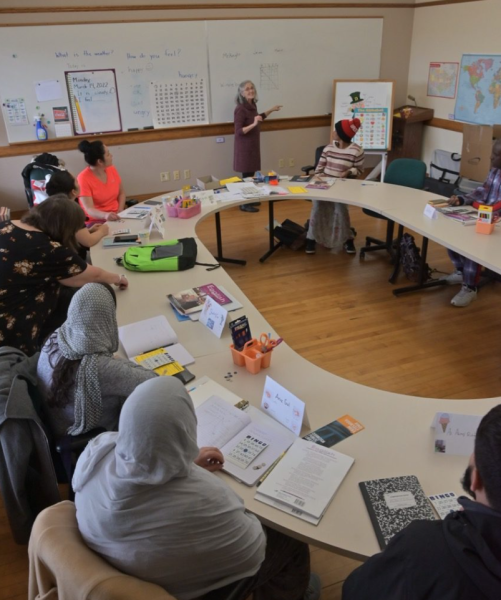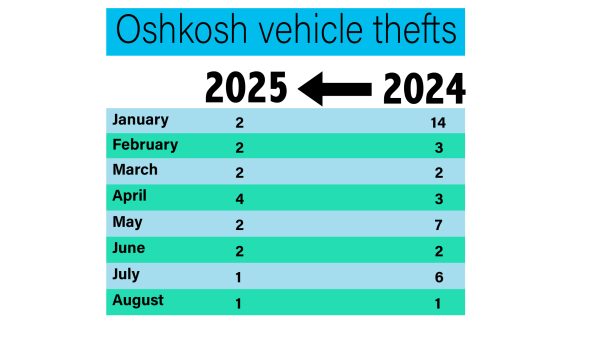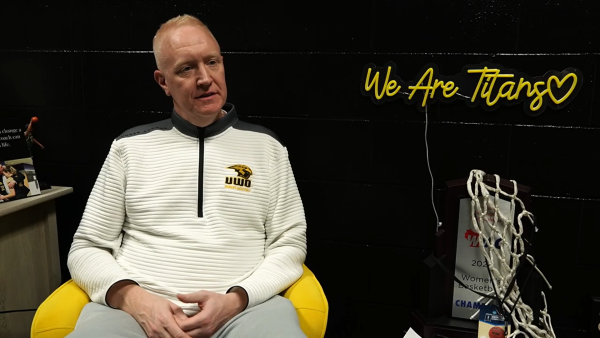Oshkosh Taiko celebrates Asian Heritage Month
The UW Oshkosh Taiko Drumming Team brought the sounds of Japan to Albee Hall on Friday as students participated in a Taiko Drumming workshop for Asian Heritage month.
The drumming team collaborated with Club Nippon to host the workshop. Oshkosh Taiko members demonstrated proper drumming techniques and gave students the chance to try it for themselves.
Afterward, Oshkosh Taiko performed a few songs to show off their hard work and skills.
Associate professor of Japanese and faculty adviser for Oshkosh Taiko, Yoshiro Hanai, explained what the cultural significance of the Taiko drum in Japan is.
“Taiko literally means ‘drum’ in Japanese but Tai means ‘fat’, so it translates to ‘fat drum’, and it is a large drum,” Hanai said. “Taiko drumming has been around for a long time and can be traced back to the gods in Japan playing Taiko in Japanese mythology. People started using the drums for religious reasons like Buddhism; that’s where the Taiko drumming was primarily used in the past. Peasants also used to use the drums to scare off insects and bugs when growing rice, and that continued through the modern time.”
Hanai said after WWII, Taiko drumming became more westernised and was used primarily in music.
“In the 1970s, the group called Kodo really took the Taiko drumming performance to the next level by composing lots of songs,” Hanai said. “The group moved to an island in Japan, and it became a big hit in Japan. Watching that huge success, many groups followed in their footsteps using the Taiko drum.”
Hanai said he formed the Oshkosh Taiko Drumming Team to bring more cultural awareness to campus.
“I came to this campus in 2009, and during that time we had Japanese language courses, but that was it,” Hanai said. “You didn’t really see any cultural presence of Japan, so I wanted to bring something more visible and more impactful to the community, and that’s when I decided to bring this Japanese Taiko drumming to campus. We started giving performances in 2013, and we have been ever since then. I think it’s important for students to experience and enjoy different performing arts and pretty much anything from different cultures.”

The UW Oshkosh Taiko members show off their skills.
UWO student and president of Club Nippon, Yuichiro Nagai said this event brings students an opportunity they otherwise might not have access to.
“You don’t really get to see or play Taiko, Japanese drum, on a daily basis,” Nagai said. “So students can experience how Taiko is different from other types of drums. It’s really heavy, so you can actually feel the sound.”
UWO student and Oshkosh Taiko member, Benjamin Alden said Oshkosh Taiko gives him the chance to improve his Japanese by helping teach other students the language during songs.
“There are not very many opportunities to speak Japanese outside of class and that’s one of the drawing points to Oshkosh Taiko,” Alden said. “It’s nice to be a part of something that’s from Japan that you wouldn’t otherwise hear about.”
Member of Oshkosh Taiko Dawn Shimura is a community member who speaks Japanese and has been a part of Oshkosh Taiko for about four years.
“For me, I’ve lived in Japan for 12 years, so when I heard the sound, it brings back memories of my time in Japan, especially summer and the drumming that you hear at the festivals,” Shimura said. “So to be able to experience that here in this form is quite amazing.”
Shimura said students should have access to learning about all cultures.
“I think it’s not so important that Japan in particular be brought forward like this, but the culture of many countries are presented in its true form and that people have the chance to experience the many different cultures around the world,” Shimura said.
Shimura said anyone can join Oshkosh Taiko after taking a Japanese learning course at UWO.
“To be able to play drums in a community-based drum group is really cool,” Shimura said. “Anyone can take part, and it takes practice to become good, but it doesn’t matter where you come from. You can be a part and learn, and you just keep working at it and become better over time.”










